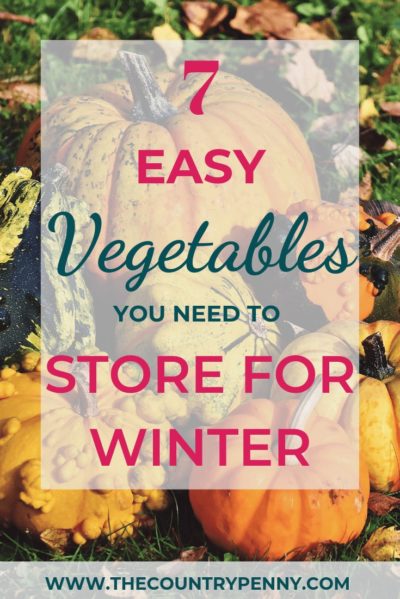Don’t have time to read it now? Pin it for later!
If you’re anything like me you always go a little bit overboard when you’re planting your garden in the spring. Then we end up with tons more vegetables than we could possibly eat fresh. I can’t stand the thought of putting all the time, money and energy into raising my own food, just to see it go to waste. Storing vegetables for winter is a big part of homesteading. I can, freeze, and dehydrate food all summer long.
While I love canning, freezing, and dehydrating my garden produce, by the end of the summer I’m pretty burnt out. Most of the veggies we grow take a lot of work to preserve for winter, but there are some that are incredibly easy to store! It is so nice to just harvest the vegetables, put them in the pantry and then pull them out in six months for dinner.
There are a few general rules for selecting vegetables that you want to store for the winter.
1. Make sure that you store the best of your produce. Don’t try to store bruised or cut produce. It will spoil quickly and often times will cause the good produce to spoil too.
2. Vegetables need to be fully ripe but not over ripe. Both over and under ripe vegetables will spoil.
3. Store produce in a cool dark place. Basements and root cellars are ideal, but I’ve successfully stored vegetables in an unheated room and in the garage so don’t be afraid to try unusual places. Just be sure that it won’t freeze or get too damp.
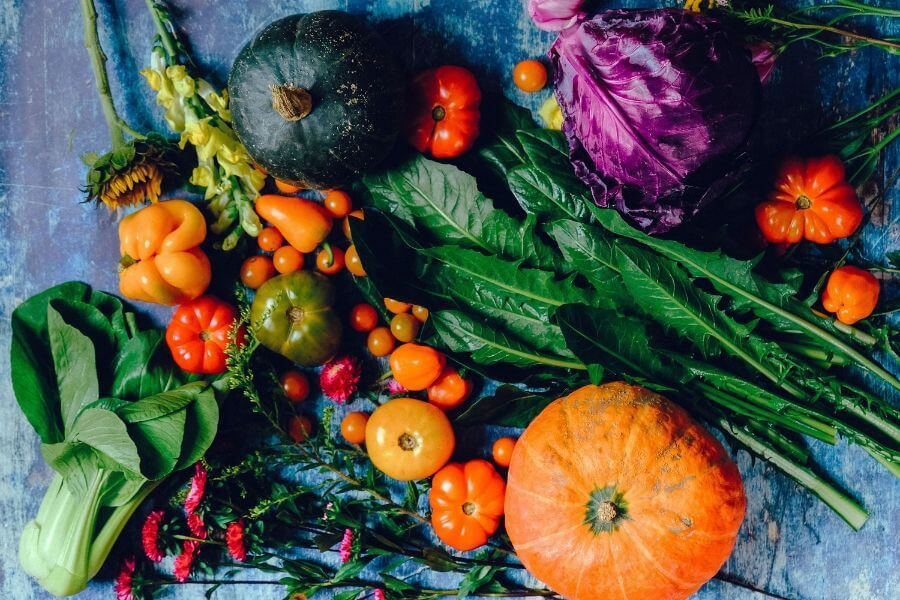
Squash
First on the list is squash. Squash are one of the easiest vegetables to store. Simply pick them and put them on the shelf in a cool place. Squash don’t like to be set directly on cement, so put some cardboard under them but otherwise they’re pretty fuss free.
The type of squash that you grow is important. You want to grow winter squash like acorn, butternut, and banana squash. One of my favorite winter squash is spaghetti squash. My family loves it and we eat it at least a couple times a month.
Don’t try to store summer squash like zucchinis or yellow crookneck squash for the winter. They will spoil very quickly since they have a thin skin.
Garlic and Onions
I lumped these together because they are so similar in storage.
Both garlic and onions should be cured before storage. Simply lay them out in a dry place for three days to a week. A wire shelf works really well but you can also just lay them out on the ground as long as its dry.
Once they’ve cured, they can be braided or just stored in breathable bags. Onions and garlic like lots of air circulation and don’t want to get damp or they will rot.
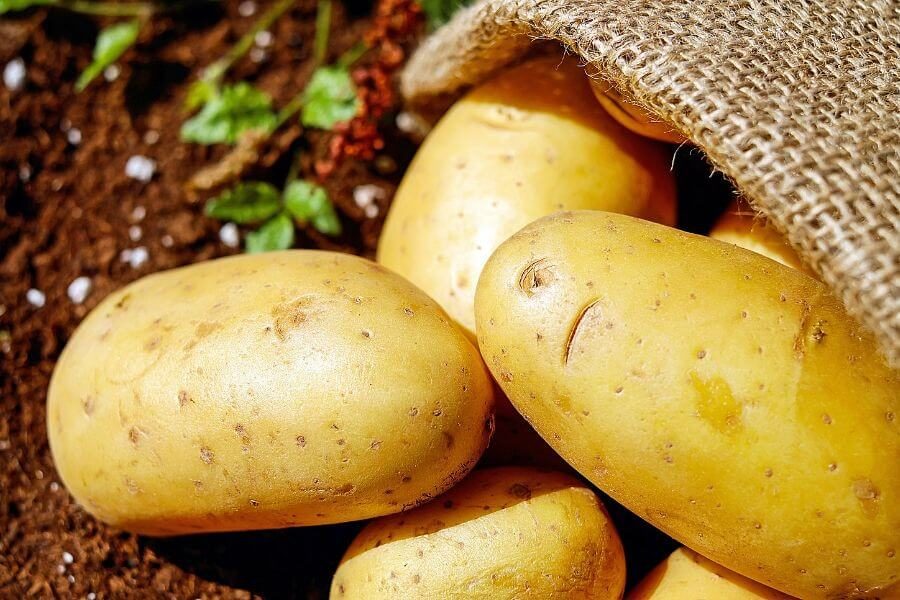
Potatoes
You guys, I’m an Idaho girl born and bred. Potatoes are pretty much a requirement in my garden! Potatoes can store really well for almost a year, but they have to be stored correctly to last that long.
Most importantly, do not wash potatoes before storing them! Just let them dry in a shady place, then brush any large clumps of dirt off of them before storing them in a cardboard box. Some people use plastic bins with holes in them, but I’ve always had more potatoes that rotted in plastic bins than cardboard boxes. Wood boxes with slats can work well too. Whatever you use just remember that they just don’t like to get too damp.
Potatoes must, must, MUST stay dark or they will try to sprout. I cover them with an old blanket to block out the light, but still let them breath. I also store them in a dark room or cupboard if at all possible.
Don’t eat potatoes that have turned green. When potatoes are exposed to sunlight they turn green and develop a toxin, solanine, that can make you sick. They will also have an unpleasant bitter flavor.
Check potatoes at least once a month and remove any that have spoiled to extend their storage life as long as possible. Spoiled or rotten potatoes will ruin an entire box of potatoes very quickly so make sure to remove them as soon as you notice them.
Beets
Beets like to be stored in a cool dark place. They are pretty similar to potatoes in their storage requirements, but they aren’t as fussy about the dark. I don’t usually store a lot of beets, since the rest of my family likes pickled beets, but they always store beautifully.
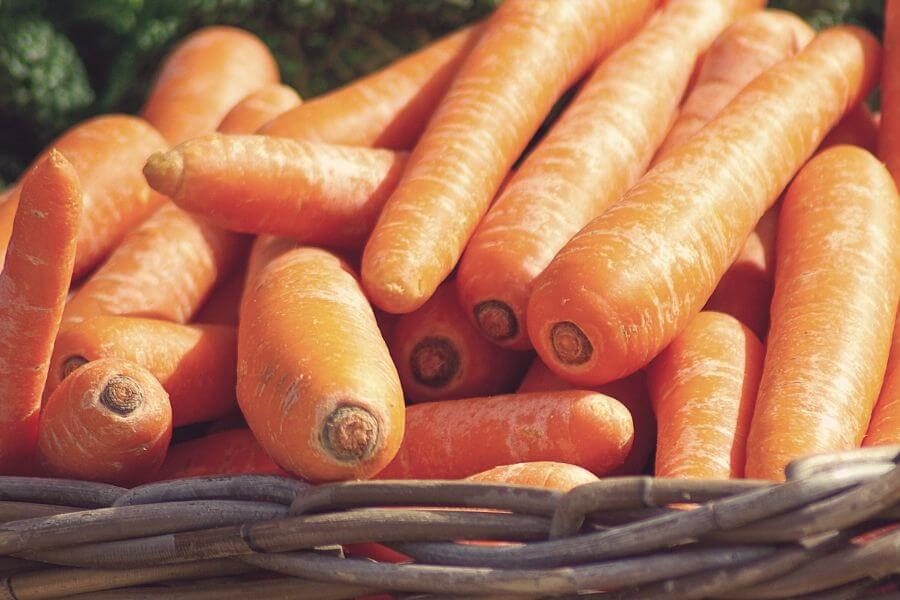
Carrots
Carrots are a little more work to store for the winter than potatoes or beets. Carrots store best in damp sand. Since damp sand is a bit of a pain to deal with, I use perforated plastic bags to store them instead.
If you live in an area where the ground doesn’t freeze solid you can leave them in the garden until you need them.
Cabbages
Cabbages store really well in a cool dark spot.
To help prevent them from making the entire house smell like cabbages, wrap them in a few layers of newspaper before storing them in a plastic bag with a few holes poked in it. Cabbages can last for up to six months, but they get stronger flavored the longer you store them.
I try to use cabbages within four to five months and they still taste good. You will usually have a few dry leaves on the outside of stored cabbages to peel off, but they store amazingly well for a leafy vegetable.
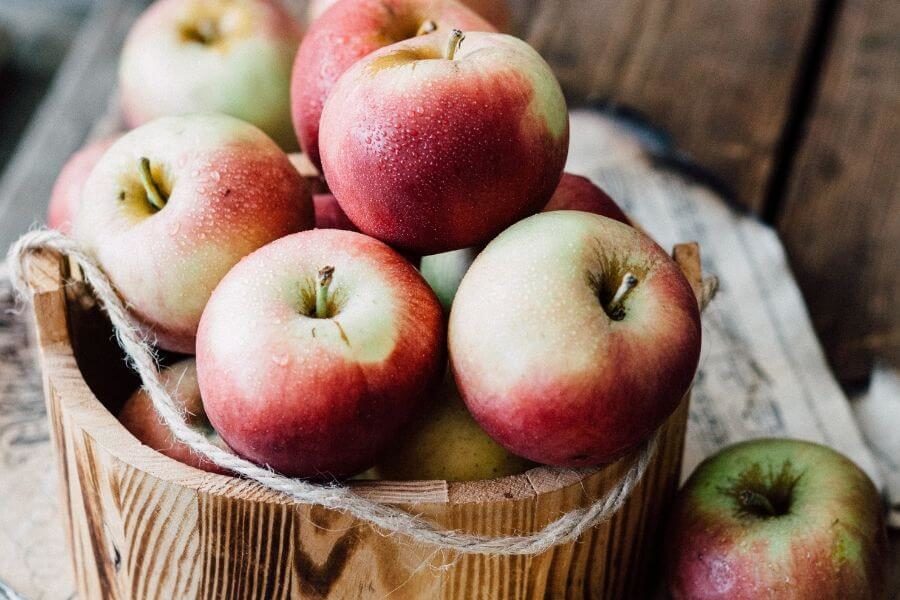
Apples
I know, apples aren’t vegetables. But most people are shocked to find out that you can store fresh apples over the winter.
Apples should be stored in a cardboard box with newspaper between each layer of apples. Some people wrap each apple in newspaper. It is probably better that way but I’m not a great rule follower and I’m usually in a hurry.
Apples need to be stored separately from the rest of your fruits and vegetables. This is because they release ethylene gas as they ripen, which causes other fruits and vegetables to ripen and spoil faster. However, apples are great to put in with green tomatoes since they will help them ripen quickly.
Apples need to stay very cool, but above freezing for best storage.
Trying to preserve a huge harvest from your garden can feel incredibly overwhelming. When I’m dealing with burn out at the end of a long season of canning, dehydrating and freezing produce storing these easy winter storage vegetables is a welcome break from preserving the rest of the garden harvest at a frantic pace.
What are your easiest fruits and veggies to store? Comment below, I’d love to hear from you!
Pinterest image
